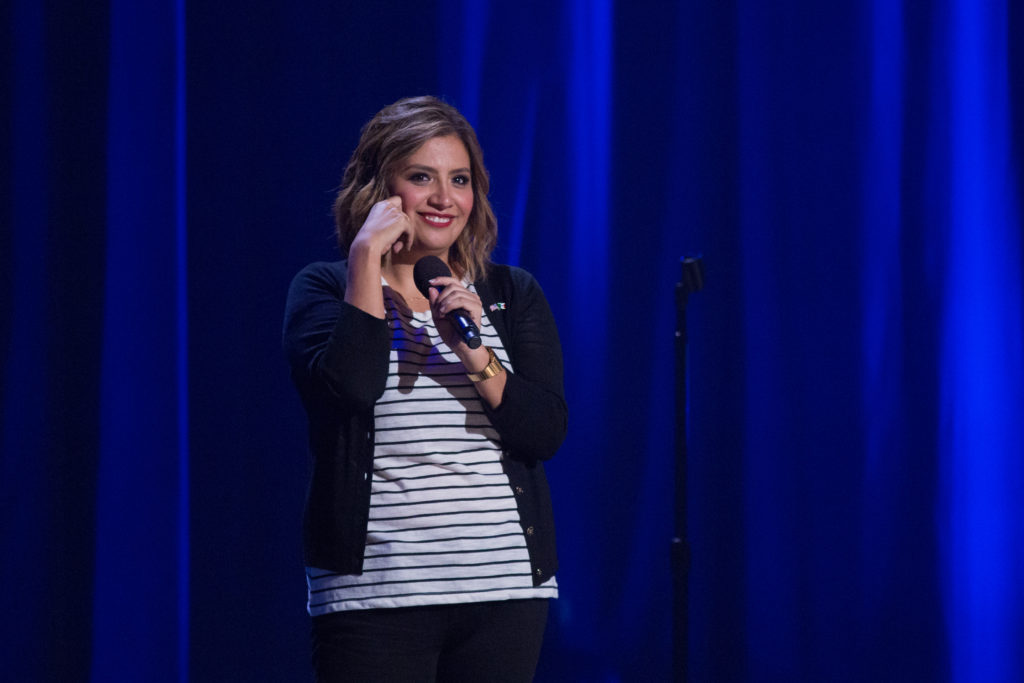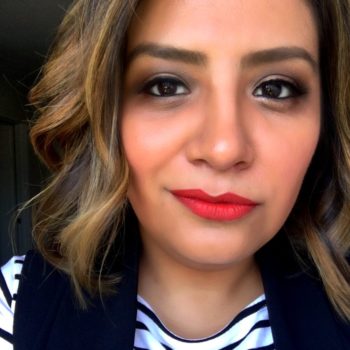Comedian Cristela Alonzo grew up in south Texas and got her start performing stand up in Dallas. Then she struggled for years in the L.A. comedy scene before becoming the first Latina to write and star in her own TV show. It was called “Cristela” and it aired on ABC. Her new comedy special launches this Tuesday on Netflix, it’s called “Lower Classy.” She talks about the special and how her family had a major influence on her jokes. (Find her advice for the proper way to dine on pan dulce here.

Cristela Alonzo: Didn’t you love that name [“Lower Classy”]? I love that name.
Brendan Francis Newnam: I do like it. Did the name come before the special or after you finished the special?
Cristela Alonzo: You know, it came years ago, I had an idea for something and I wanted to call it “Lower Classy,” and it never took off. And then when I finished taping it, the special, I thought-
Brendan Francis Newnam: “At last!”
Cristela Alonzo: “This is what I was waiting for!”
Rico Gagliano: “It’s happened.”
Brendan Francis Newnam: I made this T-shirt with a marker, I can wear it now.
Cristela Alonzo: “Finally! Justice.”
Rico Gagliano: So your comedy, it is off an autobiographical and the title refers to your background.
Cristela Alonzo: Yes.
Rico Gagliano: In the special, just to get an idea of your background, do you describe your fourth grade fantasy about the boy band New Kids On The Block? You wanna describe that for those who haven’t seen this yet?
Cristela Alonzo: It was my daydream ’cause I was in fourth grade. I was gonna be the maid on their tour bus. And I was gonna clean the bus so good that they were gonna fall in love with me.
Brendan Francis Newnam: That’s what happens.
Cristela Alonzo: All the time! Like, I was writing “Maid in Manhattan” years before it even existed. But it’s funny, the actual reason that I thought like that was because all the women in my neighborhood, that’s what they did for a living. A lot of them worked in restaurants or they cleaned houses. I didn’t understand till I was older, I’m like, “You can do more than that.”
Brendan Francis Newnam: When was the moment you realized that? That you could do something?
Cristela Alonzo: You know, my brother used to take me to the public library and drop me off. The entire day I would stay there and just read. I grew up in a border town in south Texas. And we were very isolated from everything. So it wasn’t till I actually went to the library and read that I really, it really kinda hit me that I could do other things.
Rico Gagliano: So in this special, you mention your TV show was about your particular experience. That it’s not meant to address everything for all Latinos.
But, especially given the background you just told us about, there must be this kind of duality: there’s an incredible opportunity to have such a show, but also just the weight of people’s expectations. To speak to all of them.
Cristela Alonzo: Well, yeah, it’s weird. I mean, the word Latino covers so many countries, which people forget. It’s not like it’s just like Latino-landia, or something like that. There’s so many, and for me personally, I only grew up with Mexicans. And even then, a specific demographic, like a specific regional Mexican culture.
So, it was very… it was a double edged sword. I got the show and everybody’s like, “Finally a Latina!” Like, “A Latino family, blah blah blah.” And the moment they would see it, there were some people that if it didn’t resonate with their own personal life. They’re like, “Oh this is stupid. Who lives like this?”
Rico Gagliano: “She’s a liar, maybe she’s not Latino.”
Cristela Alonzo: Exactly. And I would always say, “Well, you don’t see shows like ‘Roseanne’ and think that every white mama’s like that.”
I also wanted to show something very cultural for me where I was the youngest one in my family, and I was the one in the family that always had to sacrifice her own life to help out the family. Because I was the actor, I was the writer and that wasn’t a “real job.” And every time it would come back they would be like, “Oh. God, you failed.” “No, I didn’t fail. You guys sent me back!”
Brendan Francis Newnam: Yeah, “You asked me to come back ’cause I didn’t have to punch a clock every day at 9 a.m.”
Cristela Alonzo: Absolutely. I know a lot of Latinas that grew up like that. I was like a mom. I was helping my sister raise her kids. I was a mom that didn’t give birth to these kids. That’s why when people ask me now, “When are you having kids?” I’m like, “I’ve done that. I’ve done that.” Like, “I bought this Nintendo for me.”

Brendan Francis Newnam: Yeah. Well, it sounds like you weren’t only kind of maybe raising your sister’s children. I mean, in a way you talk in the special about raising your mother to a certain extent. Or at least kind of teacher her what it means to be an American because she’s an immigrant and you’re first generation.
Cristela Alonzo: Well, I mean, we all do that, though, don’t we? Isn’t there a point, like especially with technology, we get all this technology and then our parents are like, “What is Facebook?” And then you start talking to them like they talked to you when they were teaching you basics like numbers and words and stuff.
Rico Gagliano: Right, you’re like, “This is a VCR mom.”
Cristela Alonzo: Exactly. Exactly.
Brendan Francis Newnam: That’s true, but I didn’t have to teach my mom about the Girl Scouts and I didn’t have to like, make her unafraid of them. Can you tell us that?
Cristela Alonzo: This was actually a true story. My mom, she was trying to become a resident alien — that’s what they call it — and it took a long time. And for a time, she was undocumented waiting to become a resident alien. So there was a time when she was very scared of getting deported.
And, because we live in a border town, the border patrol agents were everywhere and my mom had never heard of the Girl Scouts, she had never seen them. And the moment she saw one, like she got so scared ’cause she saw the green uniforms and she thought they were like border patrol agents in like, training. And she freaked out.
Brendan Francis Newnam: Border patrol youth.
Cristela Alonzo: Yeah! Like a kid unit, like they had a kid unit, like border patrol had a kid unit that they were trying to create. It’s kinda hilarious, in a way, but also really interesting that people… like she associated it, the color, and I never thought of it that way.
Rico Gagliano: Maybe this is a good time to get into this question. This, as we mentioned, the show is mostly autobiographical. But you launched the show right off the bat with a string of political jokes. Many of them named it Donald Trump and his proposed wall along the Mexican border.
You taped this before the election. Now that that wall could be a reality, how do you imagine that’ll affect your set? Will you stay as autobiographical or-
Brendan Francis Newnam: Or maybe get more political?
Cristela Alonzo: You know, I think that because I talk about what my life is about I will immediately talk about what’s the most pressing issue which right now is political.
Rico Gagliano: So it’ll end up being political.
Cristela Alonzo: But, there is a way to do politics in a way that doesn’t isolate everybody. And I think, actually, by being autobiographical, that’s how you actually get to educate people the best. Because, there is no point in name calling people that don’t agree with you. But, it’s actually hard for them to negate your experience on what you’ve lived if you’re being honest about it.
Like right now we’re talking about like Obama Care, the ACA, which is the same thing, people. And everybody brings out their own personal stories and they humanize why they shouldn’t repeal it, why they want to repeal it, you know what I mean?
When you’re honest about your life, that’s when you kinda get people to get on your side even though they might not initially agree with you. So, I kinda go with that.
[This interview has been edited and condensed.]


